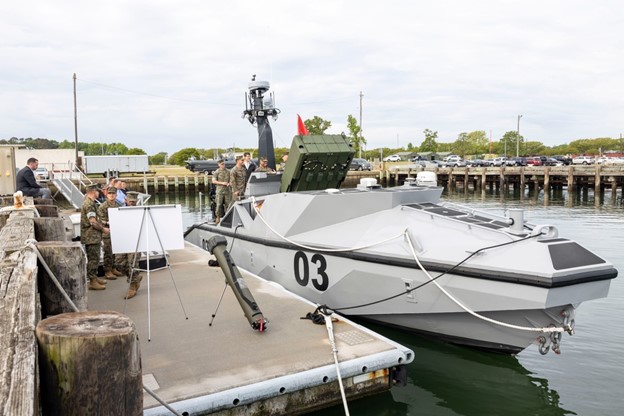
This week, dramatic videos emerged from both Russian and Ukrainian sources of an attack by unmanned kamikaze boats on the Russian surveillance vessel, the Ivan Khurs. Unmanned drone boats are rapidly changing the dynamics of naval warfare. Recently the U.S. Marine Corps showed off its Metal Shark-built long-range unmanned surface vessel (LRUSV) carrying Hero-120 loitering munitions. LRUSV’s capabilities are limited at the moment. Metal Shark said in January of 2021 it would develop the USMC’s network of unmanned vessels built to travel autonomously for extended ranges carrying loitering munitions to land and sea-based targets. Read more here from Metal Shark’s press release:
The LRUSV System will usher in a new era of naval technology while increasing the lethality of U.S. forces, with a network of unmanned vessels traveling autonomously for extended ranges and transporting loitering munitions to address targets at sea and on land.
This tiered, scalable weapons system will provide the ability to accurately track and destroy targets at range throughout the battle space. While fully autonomous, the vessels may be optionally manned and they will carry multiple payloads, which they will be capable of autonomously launching and retrieving.
Metal Shark has enlisted autonomous technology developer Spatial Integrated Systems (SIS), recently acquired by Huntington Ingalls Industries, to provide the autonomy solution for the LRUSV system. SIS is a leader in the development of multi-vessel collaborative “swarming” autonomous capabilities, sensor fusion and perception.
Under an “Other Transaction Authority” (OTA) Agreement with Marine Corps Systems Command, Metal Shark will design, build, test, and implement the vessels and will handle the integration of the autonomy system and an advanced Command and Control (C2) software suite.
In addition to the autonomous LRUSV, Metal Shark will also produce manned support vessels for the LRUSV system utilizing its 40 Defiant military patrol craft platform, which the builder is currently producing to create the U.S. Navy’s new “40 PB” patrol boat fleet.
“The LRUSV program represents a significant milestone for autonomous technology, for the defense world, and for the entire shipbuilding industry,” said Metal Shark CEO Chris Allard. “We are thrilled to be integrating advanced autonomy and Command and Control capability into these highly specialized surface vessels to provide the Marine Corps with a next-generation system.”
Under the OTA, Metal Shark will also provide the Marine Corps with associated program management, system engineering, configuration management, quality assurance, logistical support, and the development of technical publications and manuals in support of the LRUSV program.
The LRUSV program is the latest success for Metal Shark’s Sharktech Autonomous Vessels division, a wholly-owned subsidiary launched in 2018 and specifically focused on the advancement of unmanned vessel technology. In September, it was announced that the United States Coast Guard had selected a 29-foot Sharktech autonomous test vessel equipped with autonomy by Boston-based technology developer Sea Machines for evaluation by the USCG Research and Development Center. In 2019, Metal Shark was selected by US Navy PMS 406 (Naval Sea Systems Command’s Unmanned Maritime Systems division) for the Unmanned Family of Systems Multi Award IDIQ, a blanket Navy contact covering multiple topics in the autonomous space. As a brand-agnostic technology integrator actively engaged with multiple developers in the unmanned space, Metal Shark’s Sharktech division has also produced and delivered autonomous vessels equipped with autonomy solutions from L3 Harris (previously ASV Global).
#Ukraine: Yesterday, 🇷🇺MoD claimed to foil a Ukrainian attempt to attack the “Ivan Khurs” intelligence ship in the Black Sea with 3x kamikaze uncrewed surface vessels, showing one destroyed by fire from the ship.
However, video from 🇺🇦 sources shows that a USV reached the ship. pic.twitter.com/6nlhOMs7Y6
— 🇺🇦 Ukraine Weapons Tracker (@UAWeapons) May 25, 2023
🇷🇺Russian official sources confirm the USV attack on RFS Ivan Khurs in the Black Sea and say the three drones were destroyed.
Unverified footage shows one being blown up by gunfire pic.twitter.com/Wpsj8gcsBi
— Navy Lookout (@NavyLookout) May 24, 2023



